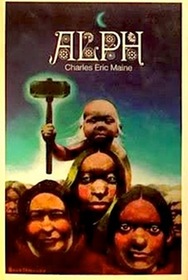F&SF novel-commentary, published in USA 1972, now somewhat dated but of historical interest, on eugenics, parthenogenesis, and male - female relationships. After 500 years of no males in the all-female society, DNA is taken from the sperm of a corpse, and re-vitalized. The consequent effects on the all-female society are devastating. Well-written, well-researched, an early novel-discussion in this field. First published in UK in 1958 as "World Without Men".
ALPH is set in a far distant future when the widespread use of a new birth control tablet has drastically affected the birth ratio of males to females-until finally no male children are born at all. Only the perfection of parthenogenesis, the development of unfertilized female egg cells, saves the human race from extinction. But parthenogenesis can only produce more females, and when the last man dies, history begins again for a new humanity of only one sex.
Five hundred years pass, and society adapts to a new condition of living. Then the frozen body of a man is found in the Arctic, and an event of major importance occurs in the government biological laboratory of Project Alpha. The dead man's chromosomes and masculine DNA factor are transferred to a female ovum, and the cell begins to divide and grow, a living male embryo has been produced!
More than a scientific achievement, the male embryo's existence poses momentous social questions. What role can one male fulfill in a monosexual society that has been adjusted to its own specialized mode of living for centuries? Supposing more male children are produced-what then? Can human society turn back the clock and resume heterosexual Living again?
The world computer brain network is given the task of answering these questions, and the child's fate is finally decided, if they allow the infant to live, society as they know it will disintegrate. The child must be destroyed.
Koralin, one of Project Alpha's scientists, volunteers to kill the baby. But without premeditation and with only a minimum of hurried planning, she takes the child from the lab and sets out to do what seems impossible, kidnap and care for the world's only male child in defiance of a ruthless totalitarian authority.
ALPH brilliantly portrays a world in which humanity's future centers on one child.
Five hundred years pass, and society adapts to a new condition of living. Then the frozen body of a man is found in the Arctic, and an event of major importance occurs in the government biological laboratory of Project Alpha. The dead man's chromosomes and masculine DNA factor are transferred to a female ovum, and the cell begins to divide and grow, a living male embryo has been produced!
More than a scientific achievement, the male embryo's existence poses momentous social questions. What role can one male fulfill in a monosexual society that has been adjusted to its own specialized mode of living for centuries? Supposing more male children are produced-what then? Can human society turn back the clock and resume heterosexual Living again?
The world computer brain network is given the task of answering these questions, and the child's fate is finally decided, if they allow the infant to live, society as they know it will disintegrate. The child must be destroyed.
Koralin, one of Project Alpha's scientists, volunteers to kill the baby. But without premeditation and with only a minimum of hurried planning, she takes the child from the lab and sets out to do what seems impossible, kidnap and care for the world's only male child in defiance of a ruthless totalitarian authority.
ALPH brilliantly portrays a world in which humanity's future centers on one child.




